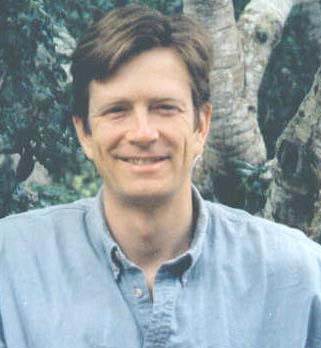Difference between revisions of "Faculty Listing"
m |
m |
||
| Line 59: | Line 59: | ||
| − | {{Faculty|Susan Watrous||Susan is the Coordinator for the College Eight Core course, a working journalist and editor, | + | {{Faculty|Susan Watrous|sw4.jpg|Susan is the Coordinator for the College Eight Core course, a working journalist and editor, and also is the Print Advisor for Student Media mailto:swatrous@ucsc.edu|}} |
[[Category:Food]] | [[Category:Food]] | ||
[[Category:Wildlife]] | [[Category:Wildlife]] | ||
Revision as of 20:43, 10 December 2009
| Candace Calsoyas | |
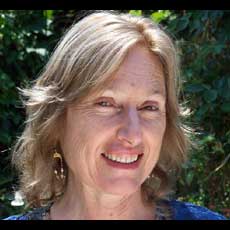
|
Born in Rome Italy to parents in the Foreign Service, her interest in travel and international life was early established. Her childhood was nomadic, the early years being spent in New Haven, Princeton, and then in Livermore where physicists congregated at the Livermore Radiation laboratory. She attended University of California, Berkeley and managed to get a degree despite the tumult created by the Viet Nam war and four years of student demonstrations. After college, she moved to Santa Cruz where she became an organic farmer. She continued to study Biology and literature at the university merging her interests in farming and literature. Her Ph.D focused on women and land in which she researched women's empowerment based on their relationship to nature and farming.
In 2004, she signed on to teach Literature of the Sea on the California Maritime Ship, The Golden Bear. For two summers, she traveled and taught on the ship going to Asia and then to the South Pacific. In 2006, she taught for Semester at Sea, going on a four month voyage around the world. When she returned, she continued teaching Literature of the Sea at College 8 in addition to overseeing the garden internship program. What has been most rewarding at UCSC has been "the opportunity to combine my love of literature, my passion for farming, and travel in my teaching career." mailto:calsoyas@ucsc.edu |
| [ website] | |
| Patrick Chuang | |
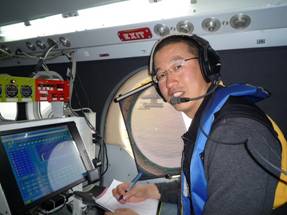
|
Patrick Chuang studies pollution in the atmosphere, which may help refine global warming models. [1] |
| website | |
| Joy Hagen | |
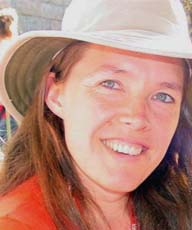
|
Joy is currently doing research on genetically modified organisms. [2] |
| [ website] | |
| Patrick McKercher | |
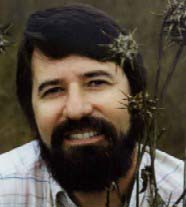
|
Patrick McKercher teaches in the Writing Program at the University of California Santa Cruz. He did his doctoral work on the nature and use of metaphor in the Rhetoric and Linguistics program at the University of British Columbia in Vancouver, Canada. He has extensive outreach experience and worked on integrating digital technology into K-16 education. In particular, he has researched the educational potential of virtual worlds from time of text-based MUDs/MOOs to the present. More recently, he has been project manager for James Burke's Knowledge Web K-Web.org, an open source collaborative and immersive knowledge navigation tool. In addition, he has worked on documentaries shown on public broadcasting such as ReConnections and So My Grandchildren Will Know. [3] |
| website | |
| Dustin Mulvaney | |
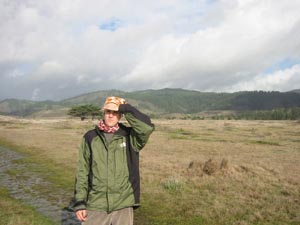
|
Dustin received a Ph.D. in Environmental Studies at the University of California, Santa Cruz, and holds a B.S. in Chemical Engineering and a M.S. in Environmental Policy Studies from the New Jersey Institute of Technology. His dissertation research explored social resistance to genetically engineered organisms and the efficacy of the anti-genetic engineering social movement. Before coming to UCSC, Dustin worked as a site engineer for a bioremediation firm. Previous to that, he spent several years in the chemical industry as a process engineer. He is currently working on turning his dissertation into a book manuscript, while pursuing new research projects on the California rice industry, criteria for salmon aquaculture certification, gene flow in maize landraces, and the effects of climate change on sugar maples. mailto:dustin.mulvaney@gmail.com |
| [ website] | |
| John Newman | |

|
John has worked as a journalist for various outdoor magazines, and is also an accomplished musician and photographer. mailto:kingfish@att.net |
| [ website] | |
| Ingrid Parker | |
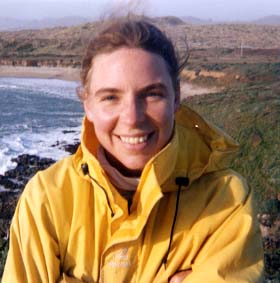
|
Ingrid Parker studies invasive plant species. She seek to understand what controls plant distribution and abundance, with an emphasis on species interactions. Much of her current work focuses on the evolutionary ecology of plant-insect and plant-disease interactions.
For many of her research questions she uses biological invasions as a tool to study ecological processes. Non-native species, which can be seen as invaders to natural communities, give us an opportunity to study ecological and evolutionary shifts in response to new conditions and new species interactions. One of her current projects is on the role of pathogens in controlling populations of native vs. non-native clovers on the California Coast. Are introduced species released from the pressure of natural enemies? Biological invasions are also one of the most urgent conservation issues of our time. She has an interest in both documenting the ecological impacts of particular invasions, and understanding the biology behind those impacts. Can we accurately assess the risk of introducing new species (or transgenic/GMO varieties)? [4] |
| website | |
| Ravi Rajan, Provost | |
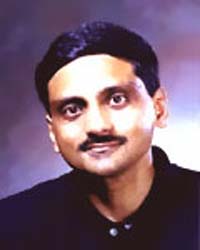
|
Ravi Rajan is a humanist and social scientist, whose research focuses on environmental issues in governance, corporate responsibility, globalization, entrepreneurship, technology choice, and risk and disaster management. Educated at Delhi (BA Mathematics, MA, Philosophy); Oxford (D.Phil., Environmental History); Berkeley (post doc in Geography); Cornell (post doc in Science and Technology Studies and Global Environmental Studies) and the Max Planck Institute, Berlin, (post doc in Environmental History and Science and Technology Studies), he is currently a tenured Associate Professor of Environmental Studies at University of California, Santa Cruz, and Provost of College Eight. Rajan has served on the editorial board of Environment and History, as Program Chair for the 2003 Annual meeting of the American Society for Environmental History; as a manuscript referee for several leading academic journals and presses, and as a referee for renowned research agencies such as the National Science Foundation. Rajan has also served as the President of the Board of Directors of Pesticide Action Network, North America(PANNA). mailto:srrajan@ucsc.edu |
| website | |
| Dan Scripture | |

|
Dan is the College Eight Writing Coordinator, has completed a novel about the Viet Nam war and has recently become a proud grandfather. mailto:scriptu@ucsc.edu |
| [ website] | |
| Robin Somers | |
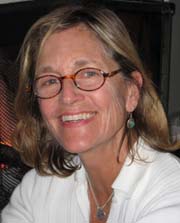
|
Robin Somers was born in Palo Alto, California. She received her BA in literature from UCSC and an MFA in Creative Writing from San Jose State University. She recently finished her first novel, Tornado Kansas, which won the Marjorie McLaughlin Folendorf and William Turnbull awards. She is a recipient of the Alice Longan award for women writing about the Southwest, and her essay on Native American boarding schools won the Charles Redd award (BYU) from the Southwest Popular Culture Association. Her work is published in the Anthology of Monterey Bay Poets, Reed Literary Magazine, Dry Ground, and others. She was a guest poet at the Berkeley Environmental Watershed Poetry Festival and often appears on Palo Alto Cable TV’s Live Poets Society. Ms. Somers served as an associate editor for The Sun (Santa Cruz) in the late-80s and a staff reporter for The Union Democrat in the late-90s before returning to teaching in the Sierra Nevada foothills, then San Jose State University. She now teaches writing for College 8 and the Writing Program at UCSC. She remains a senior faculty member of the Rocky Mountain Modern Language Association, where she recently presented a paper on Native American author and activist Zitkala-Sa and chaired a special session on The Meaning of Food. mailto:robinsomers@sbcglobal.net |
| [ website] | |
| Glen Stewart | |
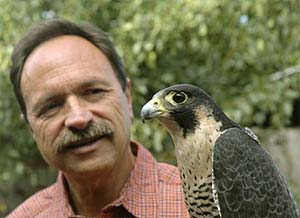
|
Glenn R. Stewart is coordinator for the Santa Cruz Predatory Bird Research Group with offices at Long Marine Lab. He is a conservation biologist who led projects to restore extinct populations of bald eagles to Central California from a research station in Big Sur, and Harris’ hawks to the lower Colorado River along the California/Arizona border. He also studied goshawks in the eastern Sierra Nevada and bald eagles at Prince William Sound, Alaska. He worked to protect public recreation and wildlife values on public lands as executive director of Idaho Conservation League during the early 1990’s.
Today, Glenn Stewart uses the iconic peregrine falcon—a species the Predatory Bird Research Group dedicated captive breeding and management expertise to that helped its recovery from near extinction—to connect people with nature. A program including “citizen science,” public presentations, falcon nest web cameras, on-line falcon discussion forums, and student internships is in place to help achieve conservation goals. mailto:gstewart@ucsc.edu |
| website | |
| Sean Swezey | |
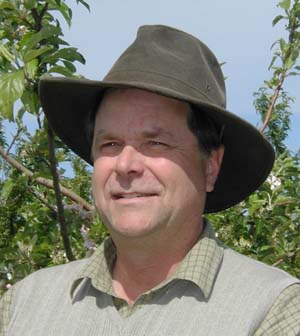
|
Sean L. Swezey received his Ph. D. in Entomology from the University of California, Berkeley in 1982. He is currently Associate Director and Specialist for organic farming systems research and extension at the Center for Agroecology and Sustainable Food Systems at UC Santa Cruz. His research interests emphasize the practical application of pest management theory and on-farm research to production of organic strawberries, apples, and other California organic crops. His career includes teaching and research appointments at UC Berkeley (1976-81), the National Autonomous University of Nicaragua, Leon (1981-1988), Cornell University (1983-84), and UC Santa Cruz (1987-present) where he has taught as Lecturer and Adjunct Associate Professor in the Department of Environmental Studies. In the department, he teaches upper division courses on organic agriculture, integrated pest management, and principles of sustainable agriculture. mailto:findit@ucsc.edu |
| website | |
| Terry Terhaar | |
| [[Image:]] | Terry Terhaar received a M.F.S. and a Ph.D. in environmental studies from Yale University. Her research resides at the intersection between the social sciences and the humanities, with an emphasis on the human-environment relationship. She has a particular focus on intense spiritual (mystical and traumatic) experience in nature; environmental values and ethics; ecology and spirituality; environmental policy; and nature literature. In addition to teaching Environment and Society, she teaches classes for the Writing Program including: Global Warming, Biodiversity, and the Environment; The Environment, Human Rights, and Social Justice; and Imagining a Better Future. Additionally, she serves as executive director of the International Society for the Study of Religion, Nature, and Culture. She loves writing, teaching, being outdoors, and talking with students about any of these activities. She especially likes talking with new students. [5] |
| [ website] | |
| Susan Watrous | |
| File:Sw4.jpg | Susan is the Coordinator for the College Eight Core course, a working journalist and editor, and also is the Print Advisor for Student Media mailto:swatrous@ucsc.edu |
| [ website] | |
